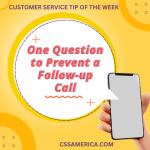
Individuals and organizations mess up; that’s part of life…
They told me that they were going to be at my home at a certain time; they were REALLY late. The customer service representative said they would get a message to a co-worker, and the co-worker would call me back; I never got a call. A salesperson promised what the company could do; the team that had to deliver the service could not meet the unrealistic expectations set by the salesperson.
In every situation, employees attempted to find an alternative solution. In not one case did anybody say “I’m sorry.”
That omission bugged me, and it took me a minute to figure out why. Then it was clear – they looked for the solution without ever acknowledging the situation that caused the need for the solution.
None of these organizations acknowledged they’d done something wrong. In not one of these cases did the person resolving the issue cause the issue, so maybe they didn’t want to admit guilt.
In situations like this, however, saying “I’m sorry” is not an admission of personal guilt. It’s showing organizational accountability. While I understand people don’t want to admit guilt (especially if they’re not “guilty” of anything), they could still say “on behalf of the organization, I apologize.” By saying that, they’re not accepting personal responsibility, but they’re acknowledging that the organization caused the problem.
Some people won’t say “I’m sorry” because they feel it’s a sign of weakness. But we shouldn’t view service recovery situations as battles where one person wins and the other loses. Instead, we should look at it as an opportunity to save a relationship, to help a customer, to serve others, to retain their business.
It’s not a sign of weakness to admit fault. It’s a sign of strength and humility to acknowledge an issue.
When your co-worker or your organization makes a mistake with a customer, make an apology a part of your response.
Signup for FREE Tips! Contact Us More Resources for You Visit Our Home Page























